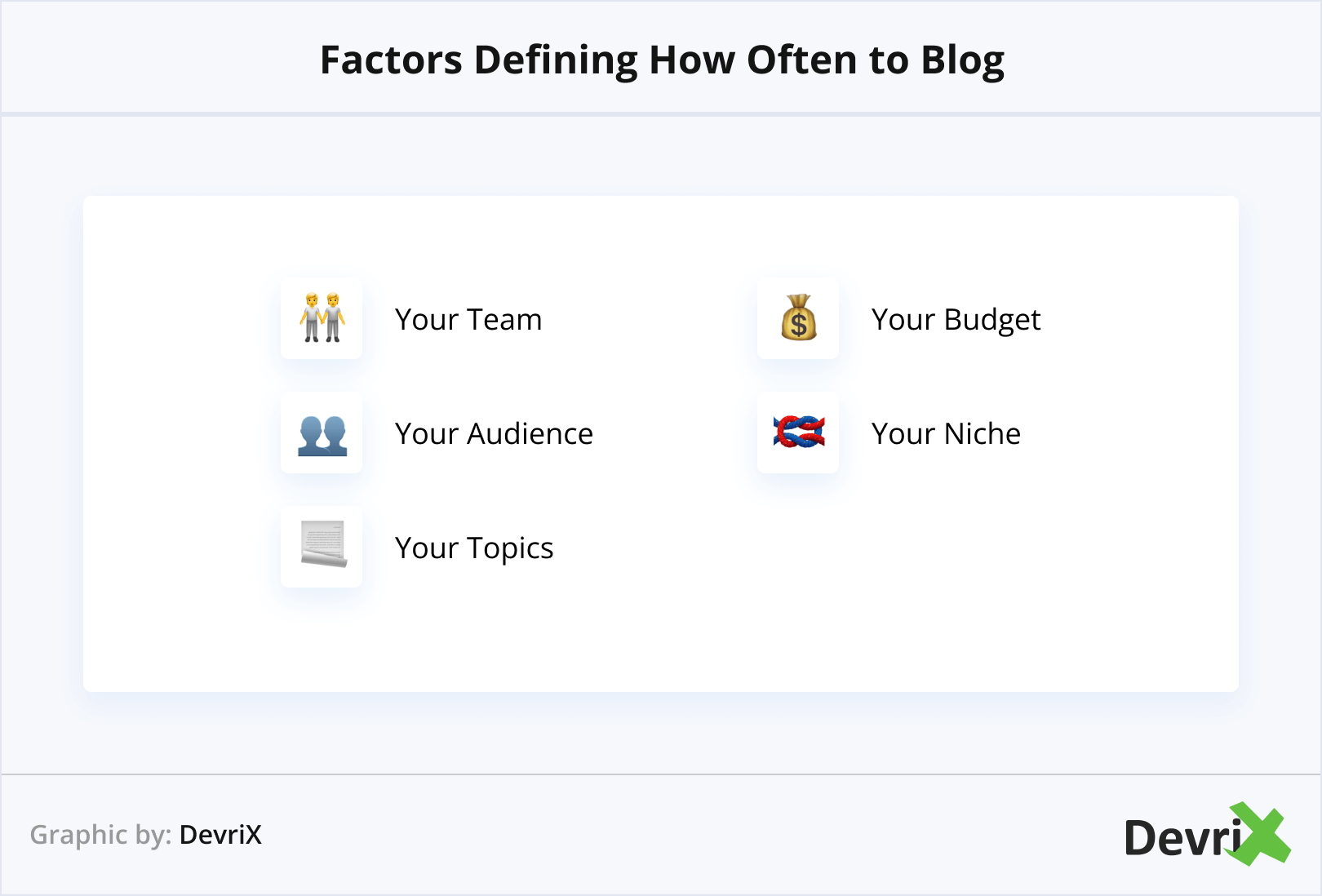Nowadays, every company that cares about its digital presence and SEO runs, or at least considers, creating a business blog.
However, for blogging to be successful and deliver the desired results, businesses need to address it strategically and consistently.
One of the necessary first steps when planning a blog is creating an editorial calendar and a workflow that can streamline the process and ensure productivity and efficiency. To do this, you need to set up a posting schedule and decide how often to blog.
And that’s a decision that you shouldn’t take lightly.
When it comes to the ideal blog post frequency, there are many factors at play, and to find the approach that’s best for your business, you should take them all into account. Otherwise, you may not be able to keep up with either the quality or the quantity of your content creation efforts.
In this article, we’ll be talking about how often you should blog depending on your business needs and your SEO goals and will highlight some of the most important factors that help you determine the best blogging frequency for you.
Read on and take notes!
Why Does Blogging Frequency Matter for SEO?

For search engines, it’s essential to present users with not only relevant but accurate and up-to-date information.
That’s why Google prioritizes fresh content.
Usually, the SERPs pages show content from sites that are regularly updated because the information there is more likely to be current.
This way, the algorithm is less likely to provide misleading content, such as, for example, an eCommerce store that is out of service, a SaaS product that is no longer available, a brick-and-mortar shop that has been closed, and so on.
However, the service pages and general content on websites are not updated very often, because, more often than not, they provide static information that doesn’t change much.
At the same time, even when they stop being operational, most companies don’t delete their websites, or leave messages that they are out of business, and this can create confusion for both customers and search engine robots.
This is where blogging comes in.
Regular website activity, such as posting new content, makes it easy for the bots to understand that the business is still operational and active.
It’s a definitive sign that your business is not only alive and kicking, but that you are eager to provide your customers with fresh, interesting, and engaging content.
As a result, they can crawl and index your content properly, and are likely to even prioritize your website over others that are not updated as regularly.
However, while this is more or less clear to most content marketers, what causes general confusion in the community is what the ideal blogging frequency is, and how often is often enough.
What Is the Ideal Blogging Frequency?

Simply put, there’s no such thing as a universal ideal blogging frequency.
Why?
Well, how often you post on your blog is defined by your business needs and SEO goals. It also depends on your skills, audience needs, niche, and so on.
It’s a common misconception that the more often you post on your blog, the better the SEO.
In fact, posting too often can even hurt your overall SEO, especially if you are not able to deliver on quality.
Moreover, there has been no indication from Google that there’s even a need to post that often.
This means that if you create an unrealistic blogging schedule, you may be wasting time and resources when you can achieve better results with less effort.
In the SEO world, a good example of a high-authority blog that doesn’t publish very often but has a top ranking in all pertinent topics is Backlinko.

Before Backlinko was acquired by Semrush, Brian Dean, the guy behind the blog, published roughly one post a month, and still single-handedly outperformed large SEO operations and companies such as Neil Patel, Ahrefs, etc.
The reason behind this is that his posts are really meaningful, valuable, and user-centric. As a result, they attract loads of traffic, and have high engagement, returning visitors, and hundreds of backlinks.
With his knowledge in the field, Brian Dean can probably publish a few posts a week, rather than one a month, and still maintain quality. But does he need to? Nope.
And that’s why he manages to remain consistent in his blogging efforts, and keep up high rankings, without wasting time.
Factors Defining How Often to Blog
As mentioned, to find out how often you should blog, it’s best to first analyze a number of pertaining factors that are unique to your business.
These will help you find the ideal blogging frequency for your company and will allow you to optimize your blogging process rather than waste time and resources when you don’t really need to.
As a result, rather than posting three or four times a week just because some other business does, you can create a schedule that delivers value to your customers, fortifies your digital presence, and satisfies your SEO needs.
The factors you should take into account include, but are not limited to:

Your Team
The first question you should ask yourself is:
Do you have the capacity to create content as often as you want to and maintain high quality?
If you run a small content team it may be challenging to deliver the same amount of pieces a large business can.
Even if you collaborate with freelancers, you might not be able to publish every day, because you won’t have the time to ensure consistency in quality, TOV, etc.
Your Budget
High-quality content doesn’t come cheap – the more often you publish, the larger the budget you need.
To deliver on quality, make sure you take care of your team. Your writers, freelancers, managers, subject matter experts, designers, and editors need to be content with their wages, and not overworked.
At the same time, you should invest in content and SEO tools to help boost performance.
All in all, for the same budget you can produce 1-2 high-quality posts a week rather than 4-5 low-quality posts.
It’s up to you to decide:
Do you have the budget to post as often as you’d like to and still maintain the desired quality of your blog?
Your Audience

Your blogging efforts should be focused on your audience, and not just on search engines.
Besides, Google also prioritizes human-centric blogging, which means that you should research and understand your audience’s content consumption habits and preferences over anything else. To do this, different companies analyze the search queries of their audience while using scraping google technology to make this task faster and easier.
In other words:
Do your customers have the time and the interest in your content as you’d like them to?
Let’s say you keep on publishing content every day. However, if people don’t engage with it, you will not boost your SEO traffic anyway.
You Niche
If you are blogging in a narrow niche and you publish every day, you risk running out of topics very quickly.
Once this happens, it will be difficult to maintain posting frequency and/or consistency. As a result, you will, eventually, lose your audience’s attention and/or interest.
So, the next question to ask yourself when deciding how often to blog is:
Is your niche varied enough so that you can publish as often as you’d like to without saturating it too quickly?
Your Topics
Some topics are easier to write about and require less time and research to implement.
However, when it comes to complex technical, financial, and medical topics, it’s unlikely that you can create high-quality content daily. Of course, that’s unless you have an army of expert content writers.
For SEO, the expertise, authority, and trustworthiness (EAT) of pages are vital, and neglecting them can cost you not only your ranking and credibility but also your online reputation.
Furthermore, publishing too often may create quality concerns. This can make your audience doubt how much effort you are putting into your blog.
This means that before you decide how often to blog, you have to consider the following:
Can you create meaningful, authoritative, and credible content as often as you’d like to?
Bottom Line
Blogging frequency is vital for SEO.
However, how often you should blog is up to the individual. It heavily depends on your company, its goals, audience, the resources at hand, and the niche.
That’s why, when building your editorial calendar, don’t try to outdo yourself. Creating a tight publishing schedule just for the sake of it is not the right way to go. This won’t benefit your content marketing strategy. Moreover, it may even hurt your search optimization efforts in the long run.
Simply put, be smart about your blogging. Think about how you can best serve your audience, and keep up the quality.




![Small Business SEO Top 7 Benefits [2023]](https://devrix.com/wp-content/uploads/2021/12/Small-Business-SEO_-Top-7-Benefits-2023-380x160.png)